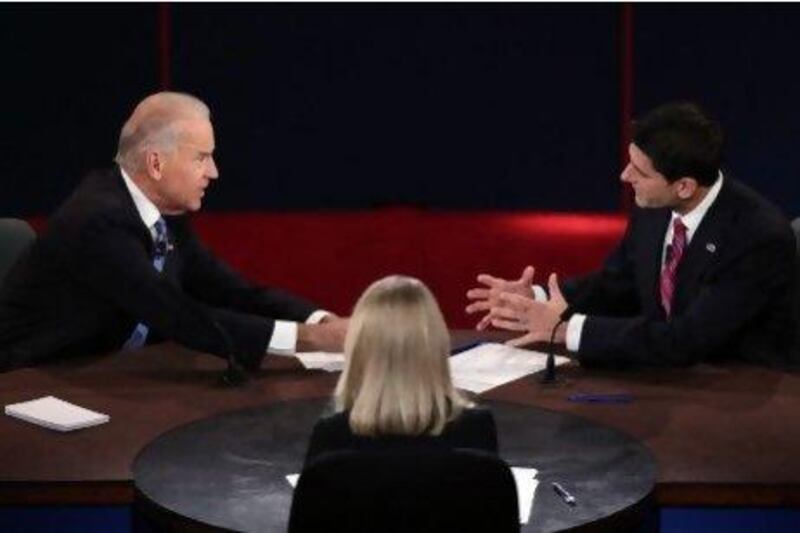WASHINGTON // Now this was a debate.
When Joe Biden and Paul Ryan met, sparks flew in a way that warmed supporters on both sides of the aisle.
It was a clash of ideas, grounded in two very different personalities, and a reminder of why American democracy is often described as "robust". It was far removed from last week's presidential debate, which seemed over-rehearsed and dispassionate.
It was Mr Biden, the sitting vice president, the grizzled veteran, bristling at Mr Ryan, the Republican congressman from Wisconsin and the rising political star who would replace him. It was the union man against the small-government budget hawk.
It crackled, it fizzed, and was sometimes factually challenged.
It also was far more important to Democrats as they sought to arrest an alarming slide in the polls.
Last week's vapid showing by Barack Obama, the US president, in the first debate left the party deflated. What before the Denver debate had seemed like an inevitable march to re-election has turned into a slog.
Mitt Romney, the Republican candidate, took the fight to Mr Obama, who didn't have a response. The polls have reflected it, with Mr Romney catching up and even surpassing the incumbent in several crucial states.
Thursday night in Danville, Kentucky, was different. There was something visceral about Mr Biden's performance, as if he had absorbed all the frustrations Democrats had pent up since that bloodless showing.
He was assertive and aggressive. The 69-year-old vice president blustered and interrupted, screwing his face into a huge can-you-believe-this grin, whenever the much younger Mr Ryan, 42, said something he didn't like.
To conservatives it was galling.
"Angry old man yells at Paul Ryan for 90 minutes," read the headline on HotAir.com, a conservative news blog.
To Democrats it was the shot in the arm they needed.
"Hello, 9-1-1? There's an old man beating a child on my TV," the comedian and Obama supporter Bill Maher tweeted during the debate.
But it may not have done much to convince undecided voters in battleground states, said Susan McManus, a professor of political science at the University of South Florida.
"The tone and interruptions and lack of respect would not resonate well with the undecided in swing states," said Prof McManus, citing voter fatigue in places like Florida, where the presidential election has been characterised by an avalanche of negative television adverts.
And though the debate was substantive, she said, the focus on foreign policy might also have turned off those voters, for whom domestic concerns were more important.
A surprising amount of time was spent on foreign policy, in fact, though little new emerged. Mr Ryan accused the administration of misleading the nation over the attack in Benghazi that killed four Americans, including the ambassador to Libya. Mr Bidenclaimed that the administration did not know there had been a request for more security, contradicting earlier state department comments.
Mr Ryan also accused the administration of being too soft on Iran. He said Iran already had enough nuclear material for five bombs, but all intelligence assessments indicate Iran has yet to take the step to produce weapons-grade uranium.
Nevertheless, Mr Ryan continued to harp on what will likely be the dominant line of the Republican's attack on Mr Obama's foreign policy.
Mr Biden responded with what is likely to be the Democratic counter: Mr Romney and Mr Ryan offer nothing new abroad and only spending cuts at home.
On Iran, Mr Biden challenged Mr Ryan as to whether he intended to "go to war", and if not, asked what difference he was proposing with current policy. Mr Ryan had no clear answer.
Domestically, Mr Biden said proposed Republican tax cuts and defence spending could not be balanced by closing tax loopholes, as Mr Romney has claimed, and accused Mr Ryan of being deliberately vague on details.
Mr Biden also said a Republican win would undermine the nation's social security programme and state assistance to the elderly, another area where Republicans are vulnerable.
Historically, vice-presidential debates are less important, often more curiosities than vote winners.
This one might be different, though, said Ms McManus.
For Democrats, it would "certainly help to narrow the enthusiasm gap, which had widened" after the first debate, she said. An eagerness to vote was crucial to both parties in an election likely to be decided by a slim margin and the ability of either side to bring out their supporters on November 6.
"Right now, they both need to appeal to the base because turnout is what's going to win the election."
Do the US debates matter? Review, r2






